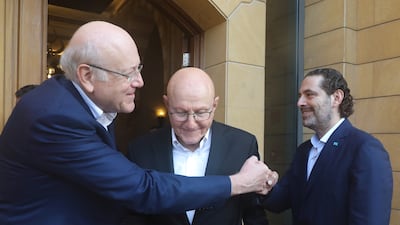Former Lebanese prime minister Najib Mikati is expected to secure backing to form a government in consultations to be held on Monday to designate a successor to Saad Hariri.
On Sunday, Mr Mikati received the support of Mr Hariri, leader of the Future Movement and former prime minister-designate.
“The Lebanese are waiting for positive initiatives to build on the French initiative and that of Speaker Berri to form a government,” ex-premier Fouad Siniora said after a meeting with Mr Mikati and another former prime minister, Tamam Salam.
"We support the candidacy of [former] premier Najib Mikati so that he can assume the task of forming a government based on binding parliamentary consultations ... and in line with constitutional rules in a bid to meet the aspirations of the Lebanese, their Arab brothers and their friends around the world, " a statement by the former premiers said.
Mr Hariri failed to form a government after 10 months of bickering. He said President Michel Aoun had dismissed his proposal to form a Cabinet that denies any one group in government a veto and sought to give his party veto power.
The Free Patriotic Movement, which Mr Aoun founded, is Lebanon’s largest Christian parliamentary bloc.
Currently led by his son-in-law, MP Gebran Bassil, it has yet to announce its position, but unconfirmed reports suggest it will oppose Mr Mikati’s designation.
Mr Bassil is an ally of the Iran-backed armed group Hezbollah and a target of US corruption-related sanctions. He previously said Mr Hariri had sought to dictate the Cabinet line-up.
Mr Mikati is expected to receive the backing of Hezbollah’s Shiite ally, Nabih Berri. The Progressive Socialist Party, led by his Druze ally Walid Joumblatt, is also set to nominate him.
A lack of support from leading Christian groups would complicate Mr Mikati’s efforts to form a Cabinet.
Under Lebanon’s confessional power-sharing system, the presidency is reserved for a Christian and the post of prime minister is held by a Sunni Muslim.
The Cabinet must be approved by the president and prime minister-designate before a vote of confidence is sought in Parliament.
On Friday, Lebanese Forces leader Samir Geagea said his party would refrain from nominating a candidate for the post of prime minister.
The blast killed more than 200 people and caused billions of dollars in damage, compounding the country’s worst economic and financial crises in decades.
Since late 2019, the local currency has lost more than 90 per cent of its value against the dollar, plunging more than half of the population into poverty.
Lebanon’s financial meltdown has led to shortages in medicines and fuel, and sparked sporadic demonstrations against rampant corruption and deteriorating living conditions. Disruptions to power, water and the internet are frequent.
The international community, led by France and the US, has said financial support is contingent on the formation of a Cabinet and its introduction of economic reform.


